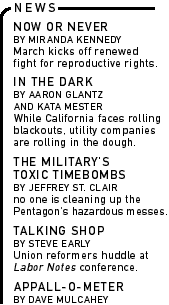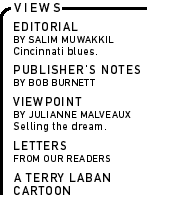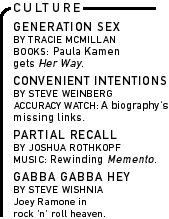

|

|

|

|
| |
 |
|||
|
In April, TV news journalists Jane Akre and Steve Wilson were honored with a Goldman Environmental Prize, one of the world's most prestigious environmental awards, for their courageous efforts to expose the potential threat to public health posed by rBGH, the genetically modified growth hormone American dairies have been injecting into their cows. What follows is the tale of their battle with Fox News, which killed their story and fired them. After three judges, 27 months of pre-trial wrangling and five weeks of courtroom testimony, the jury finally had its say. On August 28, 2000, it awarded me $425,000 in damages for being fired by TV station WTVT in Tampa, Florida. WTVT is a Fox station owned by Rupert Murdoch. The verdict made me the first journalist ever to win a "whistleblower" judgment in court against a news organization accused of illegally distorting the news. Notwithstanding being vindicated in court, I have yet to collect a dime of that jury
The story Fox tried to kill involved rBGH milk, which is produced using Monsanto's recombinant bovine growth hormone. We documented how the hormone, which can harm cows, was approved by the government as a veterinary drug without adequate testing of how it affected the children and adults who drink rBGH milk. You would think that our jury verdict, with its landmark significance for journalists everywhere, would spark some interest from the news media itself. Instead, the silence has been deafening. One of the biggest names in investigative reporting at one of the best network newsmagazines took a look at our case--and then decided not to do a story. Why not? He deemed it "too inside baseball." Translation: There is an unwritten rule that news organizations seldom turn their critical eyes on themselves or even their competitors. This rule is not absolute, of course. Some previous legal challenges involving the media have received heavy news coverage, including the battle between 60 Minutes and Vietnam-era Gen. William Westmoreland; the "food disparagement" lawsuit that Texas cattlemen brought against talk-show host Oprah Winfrey; and the multimillion-dollar lawsuit brought against ABC-TV by the Food Lion grocery store chain. All of those other lawsuits, however, involved conflicts between a news organization and some outside group or individual. Our lawsuit involved a conflict within the media, pitting labor (working journalists Steve and myself) against broadcast managers, editors and their attorneys who hijacked the editorial process in an effort to remove all risk of being sued or losing an advertiser. Prior to my firing at WTVT, I had worked for 19 years in broadcast journalism, and Steve's career in front of the camera was even longer. He is the recipient of four Emmy awards and a National Press Club citation. His reporting achievements include an exposé of unsafe cars that led to the biggest-ever auto recall in America. However, we have spent three years off the air, tied up in a seemingly interminable legal battle. Few people recognize our faces anymore. The truth is, only Monsanto really knows how many U.S. farmers are presently using rBGH, which is reportedly now injected into more than 30 percent of America's dairy herd (rBGH is trade-named Posilac, and is also known as recombinant bovine somatotropin or rBST). The company persistently refuses to release sales figures, but claims it has now become the largest-selling dairy animal drug in America. The chemical giant's secretive operations were part of what made the story of rBGH such a compelling one for me to explore as an investigative reporter. In late 1996, Steve and I were hired as investigative journalists for the Fox-owned television station in Tampa. Looking for projects to pursue, I soon learned that millions of Americans and their children who consume milk from rBGH-treated cows unwittingly have become participants in what amounts to a giant public health experiment. Despite promises from grocers that they would not buy rBGH milk "until it gains widespread acceptance," I discovered and carefully documented how those promises were quietly broken. I also learned that health concerns raised by scientists around the world have never been settled, and indeed, the product has been outlawed or shunned in every other major industrialized country on the planet. Clearly, there is not "widespread acceptance" of rBGH, not in 1996 when I began my research, and not today. Steve helped me gather and produce a TV report based on the information we discovered. The investigation began with random visits to seven farms to determine whether and how widely rBGH was being used in Florida. I confirmed its use at every one of the seven farms I visited, and then I discovered what amounted to an ingenious public relations campaign that seemed to have succeeded in keeping consumers in the dark. I learned that behind the scenes, those grocers and the major co-ops of Florida's dairymen had pulled the wool over the eyes of consumers with what amounted to a clever "don't ask, don't tell" policy combined with some careful wording to answer any inquiries about the milk. In an on-camera interview, the president of one of the two giant dairy co-ops in the state said that he had written a letter to dairymen on behalf of grocers requesting that farmers not inject their cows with the artificial growth hormone. But in response to my questions, the co-op president made a startling confession. He admitted he did nothing but write the letter. "Did the dairymen get back to you?" I asked. To this day, any consumer who calls to inquire about rBGH gets essentially the same well-coordinated response from a big Florida grocer or their dairy supplier: "We've asked our suppliers not to use it," they say. This is a truthful but incredibly misleading statement that nearly always produces the desired result, leading consumers to the false conclusion that their local milk supply is unaffected by rBGH use. Even if you ask directly, "How much of your milk comes from cows injected with an artificial growth hormone?" we discovered that you are still likely to be misled or lied to. Steve recently made an inquiry to the dairy co-op that supplies the milk served to our
After nearly three months of investigation that took me to interviews in five states, we produced a four-part series that Fox scheduled to begin on February 24, 1997. Station managers were so proud of the work that they saturated virtually every radio station in the Tampa Bay area with thousands of dollars worth of ads urging viewers to watch. But then, on the Friday evening prior to the broadcast, the station's pride turned to panic when a fax arrived from a Monsanto attorney. The letter minced no words in charging that Steve and I had "no scientific competence" to report our story. Monsanto's attorney described our news reports, which he had never seen, as a series of "recklessly made accusations that Monsanto has engaged in fraud, has published lies about food safety, has attempted to bribe government officials in a neighboring country and has been 'buying' favorable opinions about the product or its characteristics from reputable scientists in their respective fields." And to make sure nobody missed the point, the attorney also reminded Fox News CEO Roger Ailes that our behavior as investigative journalists was particularly dangerous "in the aftermath of the Food Lion verdict." He was referring, of course, to the then-recent case against ABC News that sent a frightening chill through every newsroom in America. The Food Lion verdict showed that even with irrefutable evidence from a hidden camera--documenting the doctoring of potentially unsafe food sold to unsuspecting shoppers--a news organization that dares to expose a giant corporation could still lose big in court. Confronted with these threats, WTVT decided to "delay" the broadcast, ostensibly to double check its accuracy. A week later after the station manager screened the report, found no major problems with its accuracy and fairness, and set a new air date, Fox received a second letter from Monsanto's attorney, claiming that "some of the points" we were asking about "clearly contain the elements of defamatory statements which, if repeated in a broadcast, could lead to serious damage to Monsanto and dire consequences for Fox News." Never mind that I carried a milk crate full of documentation to support every word of our proposed broadcast. Our story was pulled again, and if not dead, it was clearly on life support as Fox's own attorneys and top-level managers, fearful of a legal challenge or losing advertiser support, looked for some way to discreetly pull the plug. The station where we worked recently had been purchased by Fox, and we soon discovered that the new management had a radically different definition of media responsibility than anything we previously had encountered in our journalistic careers. As Fox took control, it fired the station manager who originally hired us and replaced him with Dave Boylan, a career salesman without any roots in journalism and seemingly lacking the devotion to serve the public interest that motivates all good investigative reporting. Not long after Boylan became the new station manager, Steve and I went up to see him in his office. He promised to look into the trouble we were having getting our rBGH story on the air. But when we returned a few days later, his strategy seemed clear. "What would you do if I killed your rBGH story?" he asked. What he really wanted to know was whether we would tell anyone the real reason why he was killing the story. In other words, would we leak details of the pressure from Monsanto that led to a coverup of what the station had already ballyhooed as important health information every consumer should know? It was suddenly and unmistakably clear that Boylan's biggest concern was the concern of every salesman, no matter what product he peddles: image. He understood that it could not be good for the station's image if word leaked out that powerful advertisers backed by threatening attorneys could actually determine what gets on the six o'clock news--and what gets swept under the rug. Boylan was in a jam. If he ran an honest story and Monsanto's threatened "dire consequences" did materialize, his career could be crippled. On the other hand, if he killed the story and the sordid details leaked out, he risked losing the only product any newsroom has to sell: its own credibility. To resolve this dilemma, Boylan offered us a deal. He would pay us for the remaining seven months of our contracts, in exchange for an agreement that we would broadcast the rBGH story in a way that would not upset Monsanto. Fox lawyers essentially would have the final say on the exact wording of our report, and once it aired, we were free to do whatever we pleased--as long as we forever kept our mouths shut about the entire ugly episode. As journalists, Steve and I wanted to get the story on the air more than anything. A buyout, no matter how attractive, was out of the question. Neither of us could fathom taking money to shut up about a public health issue that absolutely and by any standard deserved to see the light of day. The remainder of 1997 was a tense standoff, with the station unwilling to either kill or run the story. Fox attorney Carolyn Forrest was sent in to review our work, with a mandate from Fox Television Stations President Mitch Stern to "take no risk" with the story. "Taking no risk" meant cutting out substance, context and information. Boylan told us to "just do what Carolyn wants" with the story, but what Carolyn really wanted to do was destroy it. We rewrote the story, rewrote it and rewrote it again, trying to come up with a version that would both remain true to the facts and satisfy the station's concerns. Nearly a full year passed as we wrangled over this important public health story. After turning down the station's buyout offer, we ended up doing 83 rewrites of the story, not one of which was acceptable to Fox lawyers, who were fully in charge of the editing process. At the first window in our contracts, December 2, 1997, we were both fired, allegedly for "no cause." However, an angry Forrest made a major legal mistake when she wrote a letter spelling out the "definite reasons" for the firing, and characterizing our response to her proposed editorial changes as "unprofessional and inappropriate conduct." But just what is the "professional and appropriate" response that reporters should make when their own station asks them to lie on television? On April 2, 1998, we filed a whistleblower lawsuit against Fox Television. Under Florida state law, a whistleblower is an employee, regardless of his or her profession, who suffers retaliation for refusing to participate in illegal activity or threatening to report that illegal activity to authorities. We contended that we were entitled to protection as whistleblowers, because the distortions our employers wanted us to broadcast were not in the public interest and violated the law and policy of the Federal Communications Commission. Going to court against a powerful conglomerate like Fox is a daunting experience, and Fox knows how to intimidate people. Prior to our dismissal, Boylan had flaunted the company's wealth in an attempt to make us back down. "We paid $3 billion for these stations," he told us on one occasion. "We'll tell you what the news is. The news is what we say it is!" The Fox legal strategy was woven tightly from day one and helped by a well-coordinated team effort. They claimed that we had turned our backs on the story and were using the whistleblower claim as a "tactic." We missed deadlines, they said, and had told managers and lawyers we were "going to get Monsanto." They also claimed that we became convinced that rBGH milk causes cancer, and that we became advocates instead of objective reporters of the controversy. None of that was true. Our story did bring forth information that had been suppressed for far too long: that a spin-off hormone in the altered milk has been linked to tumor proliferation; that consumers did not have the benefit of labeling at the grocery store shelf because Monsanto had sued two small dairies to block it; and that the FDA's Center for Veterinary Medicine, which reviewed the drug, did not do long-term human toxicity tests. The cancer questions to this day remain unanswered. The human effects are, in essence, being tested on consumers in the marketplace. The Fox effort, though united, was not flawless. Fox News Vice President Phil Metlin told the six-person jury that if he ever learned a news organization was trying to eliminate risk by using a threatening letter as a "road map" to craft a story, such news would "make me want to throw up." But just days later, on the stand, a local attorney for Fox admitted he did just that, using Monsanto directives to help craft the rBGH story. Metlin actually turned white. He also didn't score any points with his bosses when he admitted that he found no errors in our reporting of the rBGH story, and he saw no reason why our final version of the story could not be aired. Fox attorney Bill McDaniels earned the nickname "Thumper" from our team because he made an audible noise with his foot whenever he got nervous. There was a lot of thumping during the presentation of our case, particularly when Ralph Nader took time from his presidential campaign to serve as an expert witness. Fox had tried unsuccessfully, through objections, to have Nader eliminated as a witness. Nader told jurors what the FCC has repeatedly said, that it is "a most heinous act" to use the public's airwaves to slant, distort and falsify the news. "A reporter has a legal duty to act in accordance with the Communications Act of 1934 in addition to their professional responsibility to be accurate, not to be used as an instrument of deception to the audience," Nader testified. McDaniels also objected vehemently to Walter Cronkite's inclusion as an expert on our side. "Mr. Cronkite is not an expert in the pre-broadcast review of a story," said the Fox counsel. I couldn't believe my ears. For 30 years Cronkite was the managing editor of the CBS Evening News. During Cronkite's deposition, McDaniels had asked the 83-year-old anchorman whether he was a lawyer and suggested to Cronkite that he couldn't be an expert in the pre-broadcast review of a story unless he was an attorney. In his deposition, Cronkite said that an ethical journalist should resist directives that would result in a false or slanted story being broadcast. "He should not go a microinch toward that sort of thing. That is a violation of every principle of good journalism," Cronkite testified. The jury awarded me with $425,000. Fox immediately announced that it would appeal. The network argued to the judge that he should vacate the jury's verdict. During the trial itself, McDaniels had claimed that Fox merely wanted "to get our good name back" and repair the damage to its credibility that we had inflicted by telling our story on a Web site (www.foxbghsuit.com) and speaking to groups around the world. During the motion to vacate, however, McDaniels seemed to toss the network's credibility in the garbage by making an argument that any legitimate news organization would be embarrassed to voice. "There is no law, rule or regulation against slanting the news," he told the judge. The judge denied the motion, but years of appeals lie ahead. Every indication we have received suggests that the network plans to continue its efforts to wear us down with time-consuming, tedious and expensive legal maneuvers. Fox will appeal first to the 2nd District Court of Appeals, then the case could go to the Florida Supreme Court and eventually the U.S. Supreme Court. All the while, we won't see a cent of our winnings. They have the financial wherewithal to do this, whereas we have
been out of work for more than three years with no immediate job
offers on the horizon. Somehow we will have to find a way to house
and feed ourselves and our daughter, while simultaneously continuing
to wage a full-time battle against a media giant. Jane Akre and Steve Wilson recently formed a production company to expose environmental and health news ignored by mainstream media. A version of this article originally appeared in PR Watch (www.prwatch.org).
|


